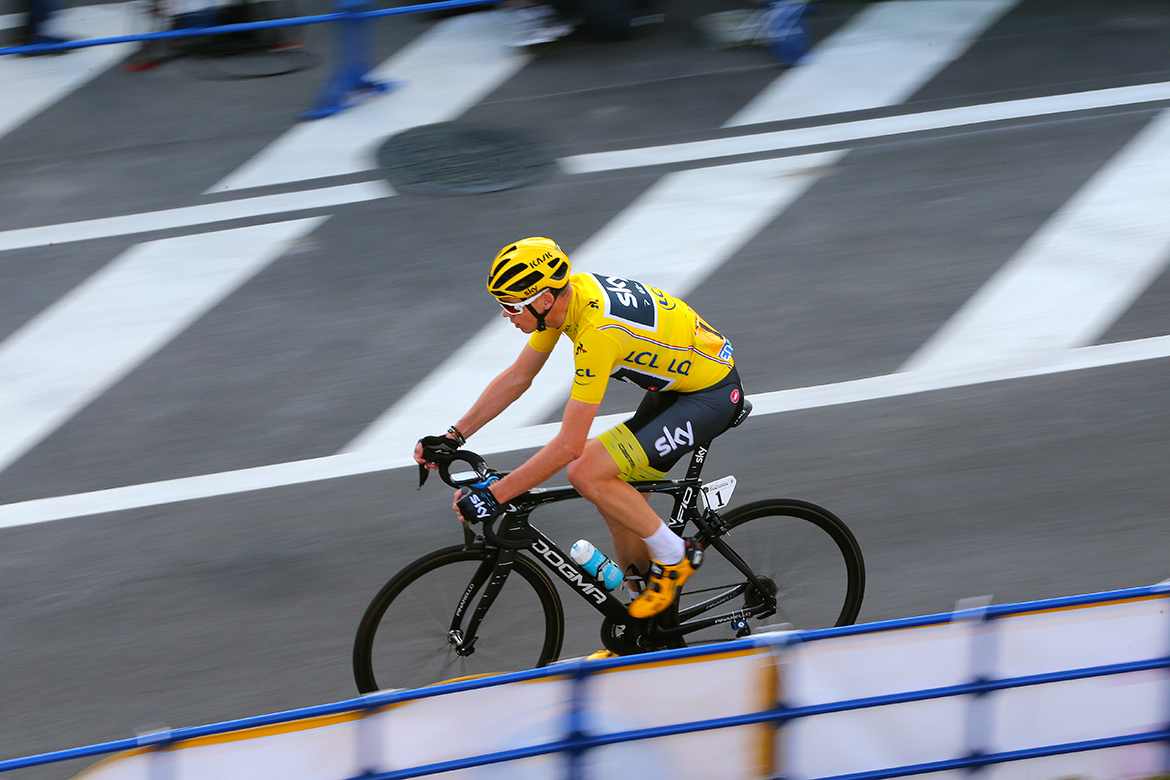Chris Froome returns adverse analytical finding for salbutamol
Team Sky leader could lose Vuelta title and face ban





The UCI has revealed that Chris Froome returned an adverse analytical finding (AAF) at the Vuelta a Espana for twice the permissible dose of the asthma medication salbutamol. The test took place September 7 following stage 18 of the Vuelta, a race which Froome won overall.
Will Chris Froome's salbutamol result sink Team Sky?
Nibali: Chris Froome salbutamol case is bad news for cycling
Vuelta a Espana organisers call for 'extreme caution' after Froome salbutamol result
A lot of explaining to do: The questions raised by the Chris Froome salbutamol case
Chris Froome: I haven't broken any rules
'A scandal' - Tony Martin sounds off on Chris Froome's salbutamol case
Both Froome's 'A' and 'B' samples revealed excess salbutamol. In a statement announcing the AAF, the UCI said that "the presence of a Specified Substance such as salbutamol in a sample does not result in the imposition of such mandatory provisional suspension against the rider."
The WADA threshold for salbutamol is 1,000ng/ml. According to the UCI, Team Sky was notified of the finding on September 20, the day he finished third in the elite men’s time trial at the UCI World Championships in Bergen.
News of the case emerged early on Wednesday morning in Europe after a joint investigation by The Guardian in Britain and Le Monde in France.
Froome has previously stated he has suffered from asthma since childhood and has used inhalers in the past. In a statement from the team, Froome explained that his symptoms worsened and he sought medical advice from the team doctor.
"My asthma got worse at the Vuelta so I followed the team doctor’s advice to increase my salbutamol dosage. As always, I took the greatest care to ensure that I did not use more than the permissible dose," Froome said in a team statement.
"I take my leadership position in my sport very seriously. The UCI is absolutely right to examine test results and, together with the team, I will provide whatever information it requires."
The latest race content, interviews, features, reviews and expert buying guides, direct to your inbox!
The Vuelta race leader after stage 3, Froome was tested following the conclusion of each stage of the race. In the team statement addressing the finding, Team Sky stated that Froome "used an increased dosage of Salbutamol".
Addressing the finding, Team Sky principal David Brailsford explained the team will co-operate with the UCI to establish the cause of Froome's elevated concentration.
"There are complex medical and physiological issues which affect the metabolism and excretion of salbutamol. We're committed to establishing the facts and understanding exactly what happened on this occasion," Brailsford said in the team release.
"I have the utmost confidence that Chris followed the medical guidance in managing his asthma symptoms, staying within the permissible dose for salbutamol. Of course, we will do whatever we can to help address these questions."
As revealed in the 'Fancy Bears' hack, Froome and Team Sky previously applied for a TUE for the corticosteroid prednisolone in May 2013 and April 2014. In 2015 at the Tour de France, Froome explained that during the race he had a medical condition which could have been treated with a TUE. However, he objected to using a TUE, explaining in January 2017 that, "I didn't feel having a TUE in the last week of the Tour was something I was prepared to do. It did not sit well morally with me."
- Chris Froome returns adverse analytical finding for salbutamol
- Will Chris Froome's salbutamol result sink Team Sky?
- Vuelta a Espana organisers call for 'extreme caution' after Froome salbutamol result
- Nibali: Chris Froome salbutamol case is terrible for the sport
- Froome's salbutamol case and what it means for him, Team Sky and cycling - Podcast
The facts on asthma and WADA rules
- Asthma is a chronic lung disease that inflames and narrows the airways. Asthma causes recurring periods of wheezing, chest tightness, shortness of breath, and coughing.
- Asthma is more common among elite athletes than the general population (70 per cent of swimmers and 30 per cent of Team Sky have it, according to a 2014 article in The Guardian, as opposed to 10 per cent of the general population).
- Asthma is typically treated with inhaled corticosteroids (eg. Fluticasone/Flovent - not prohibited in competition), and bronchodilators (inhaled beta 2-agonists such as salbutamol/albuterol).
- Oral or injected beta 2-agonists can have anabolic effects and are banned in and out of competition. Inhaled, they are not considered performance enhancing. Inhaled doses are allowed in competition without a TUE at doses up to 1600 microgram over 24 hours or 800 micrograms every 12 hours.
- Anti-doping authorities can reliably determine salbutamol was taken orally or injected because it undergoes chemical changes in the body, but those changes do not occur if it is inhaled.
- If a rider’s urine contains more than 1000ng/ml of salbutamol it is considered an Adverse Analytical Finding.
- The threshold of 1000ng/ml was set by a scientific study, but metabolism of the drug varies greatly from person to person.
- In cases of an AAF exceeding the threshold for inhaled salbutamol, athletes can submit to a pharmacological study of their metabolism of the drug to try to prove exceeding the dose was unintentional.
- Because salbutamol is a specified substance under WADA rules, the UCI’s anti-doping rules do not require a provisional suspension while the case is further adjudicated.
- UCI rules allow for at minimum a reprimand and maximum two years ineligibility if a rider can establish no significant fault for the AAF.
Previous salbutamol cases
According to the UCI’s list of anti-doping violations, there are currently no riders serving suspensions for positive tests for salbutamol.
The most recent high-profile case involving a positive test for the substance concerned Diego Ulissi in 2014. The Lugano-based Italian returned a sample containing 1,900 ng/ml – lower than the level in Froome’s sample – at that year’s Giro d’Italia. After undergoing further testing in Lausanne in a bid to replicate the conditions, he was eventually handed a backdated, nine-month suspension in January 2015 by the Swiss Cycling Federation.
Alessandro Petacchi returned a sample containing 1,352 ng/ml of salbutamol during the 2007 Giro d’Italia in a test after he won the sprint in Pinerolo. Although the Court of Arbitration for Sport accepted Petacchi’s insistence that he had not used the substance with the intention of enhancing his performance, the Italian was formally sanctioned in 2008, when he was handed a backdated 10-month ban that ran from October 31, 2007, to August 31, 2008. He was also stripped of his three stage wins on the 2007 Giro d’Italia.
The inconsistency in sanctions for the use of salbutamol was underlined by the fact that Leonardo Piepoli also returned a positive test for the substance in 2007, but was not sanctioned.
Miguel Indurain tested positive for salbutamol at the Tour de l’Oise in 1994, but although the substance was prohibited by the French Sports Ministry, it was permitted by the UCI with a prescription at the time, and the Spaniard – who, like Froome, had just claimed a fourth Tour title – did not serve a ban.
A similar divergence in regulations was apparent when Igor Gonzalez de Galdeano tested positive for salbutamol during the 2002 Tour de France. Although the UCI did not hand the Basque rider a sanction, he missed the 2003 Tour as he was suspended from competing on French soil by the French anti-doping council (CPLD).
In 2010, WADA changed the rules regarding the use of salbutamol, decreeing that the substance no longer required a TUE but rather a simple declaration of its use. In the intervening period, Ulissi and Alexandre Pliuschin tested positive for salbutamol, with each rider eventually serving nine-month bans.
